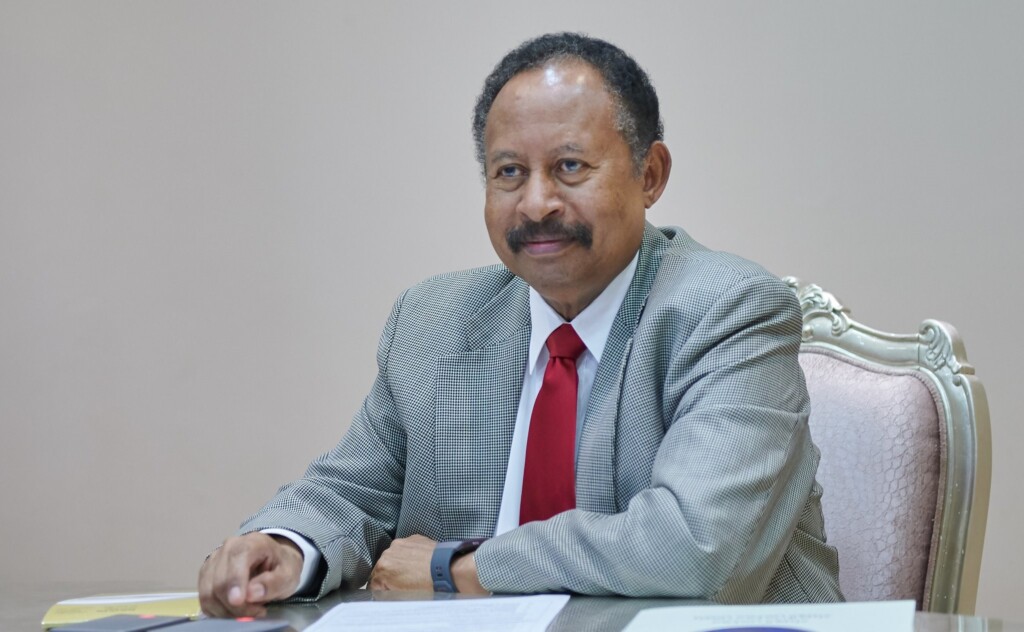Hamdok to Dabanga: ‘We are still waiting for a meeting with Sudan army leadership’

Former Prime Minister of Sudan, Abdalla Hamdok (File photo: SUNA)
Dabanga journalist Ashraf Abdelaziz interviewed former Sudanese Prime Minister Abdalla Hamdok, currently serving as the head of the Sudanese Civil Democratic Forces, better known as Tagaddum. They discussed recent diplomatic initiatives aimed at halting the war, and challenges in facilitating dialogue between the parties of the ongoing conflict in Sudan.
In an exclusive interview with Dabanga, Tagaddum chairperspon Hamdok shed light on the coalition’s ongoing efforts to prepare for its founding conference, and its engagements with political, revolutionary, and civil forces in Sudan.
“We are holding several workshops prior to the conference. The first will take place in the Kenyan capital, Nairobi, next week, and the rest will follow until mid-March. Our aim is to have all preparations finalised by then.”
Asked about the reasons behind the postponement of the founding conference, initially scheduled for December, the former prime minister said: “The primary issue is facilitating the participation [travel] of attendees from Sudan, as hosting the event within the country is currently unfeasible.
“Although it would have been possible to hold the conference in December, our goal is not to merely convene, but rather to host a comprehensive and representative dialogue encompassing all segments of Sudan. This is a complex process, particularly amidst the ongoing war.”
Invitations
Tagaddum reached out to various political and revolutionary forces in Sudan to extend invitations to the conference.
“We met in Cairo with the Arab Socialist Ba’ath Party. We sat down with the Sudan People’s Liberation Movement-North led by Abdelaziz El Hilu (SPLM-N El Hilu), and the Sudan Liberation Movement led by Abdelwahid El Nur (SLM-AW). We also have contact with the Popular Congress Party (PCP) led by Ali El Haj, and the Democratic Unionist Party (DUP).”
Upon establishing contact, Tagaddum proposes three collaboration options. “Parties may choose to join the Tagaddum coalition. Alternatively, they can participate in developing a collaborative action plan without becoming full members. The third option involves participation in the conference’s activities, including workshops.”
SAF-RSF contact
Regarding contact with the Sudanese Armed Forces (SAF) and the paramilitary Rapid Support Forces (RSF), Hamdok explained that “in December, Tagaddum sent two letters to both parties’ leadership. The RSF promptly responded, leading to a meeting with ‘Hemedti’ [RSF commander Mohamed Dagalo], during which we ratified what is now known as the Addis Ababa Declaration”.
In early January, a delegation of the alliance, headed by Hamdok, met with RSF Commander Mohamed ‘Hemedti’ Dagalo in the Ethiopian capital. The meeting led to the signing of the Addis Ababa Declaration, in which RSF agreed “to immediately and unconditionally stop hostilities” in direct negotiations with the Sudan Armed Forces (SAF), provided that Tagaddum agrees with the army commanders “to adhere to the same procedures”.
Asked if the RSF implemented the terms stipulated in the Addis Ababa Declaration, Hamdok told Abdelaziz that the militia “reaffirmed their commitment to implement the practical measures of the agreement, including the release of 451 prisoners of war. However, the release is hindered by the absence of the International Committee of the Red Cross (ICRC) in Sudan”, who Hamdok says would act as a third-party mediator.
Concerning the SAF, “communication was initiated with the army leadership, but no clear resolution regarding a meeting has been reached despite successive follow-ups. So, the issue remains pending. The last phone call with the army was two weeks ago, again to discuss arranging a meeting.”
Addressing calls to hold a meeting with the SAF in Port Sudan, Hamdok emphasised that Tagaddum “has no objections to holding the meeting anywhere in the country. However, as we’ve stressed to the concerned parties, Sudan is currently in a state of war, and the presence of the SAF command in Port Sudan [rather than in the capital Khartoum] underscores the abnormality of the situation”.
“We urge them to focus on convening the meeting,” he continued, highlighting that “the primary objective is not the location but rather fostering an atmosphere conducive to open and productive discussions, which is currently lacking”.
“We’ve stressed to the RSF the imperative of honoring the Addis Ababa Declaration and preventing it from becoming mere rhetoric.”
Diplomatic efforts
In response to whether both sides can move towards a bilateral agreement, Hamdok positively perceived the efforts in Jeddah, aimed at facilitating dialogue between the conflicting factions to halt the war.
“The talks, facilitated by Saudi Arabia and the United States, expanded in Manama with the inclusion of Egypt, the UAE, and Bahrain. If momentum continues towards achieving a ceasefire, halting hostilities, and facilitating humanitarian aid delivery, it could significantly alleviate the suffering of the Sudanese people.”
However, the Tagaddum leader believed that such efforts “must be complemented by a robust political process, ideally under the guidance and supervision of the Intergovernmental Authority on Development (IGAD) and the African Union (AU)”.
“Success in one track would bolster the other. We advocate for parallel progress in both tracks to effectively address the crisis.”











 and then
and then